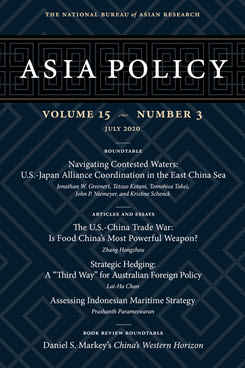Strategic Hedging
A “Third Way” for Australian Foreign Policy in the Indo-Pacific
This article explores the viability of “strategic hedging” for Australia to insure itself against three security risks: excessive reliance on China for economic growth, China’s political and military domination of the region, and a reduction in U.S. strategic commitment to the region.
Executive Summary
MAIN ARGUMENT
The current strategic debate within Australia about the country’s role as a middle power in the Indo-Pacific is framed as a binary choice between China (as the country’s principal economic partner and market) and the U.S. (as its chief security and political ally). However, this binary option is false. There is a viable third way that would avoid a choice of one side at the expense of the other. This option is overlooked because Australia’s hedging policy has yet to reach its full potential and can currently be described as “under-hedging” (i.e., not doing enough to reduce uncertainty about future risk). The weak link in Australia’s current hedging is the failure to enmesh regional powers. Without enlisting more partners on its side, Australia often either relies on the U.S. or acts mostly bilaterally in dealing with risks shared by many regional states.
POLICY IMPLICATIONS
- If Australia continues to frame its strategic debate as a binary choice, it will likely be unable to optimally manage its security risks and potentially risk losing either its principal economic partner or its chief security and political ally.
- A viable third option to Australia’s current policy of under-hedging is strategic hedging: not choosing between China and the U.S. but instead engaging actively with other middle powers—notably India, Indonesia, Vietnam, Japan, and South Korea—to avoid negative future scenarios or unexpected shortfalls.
- The value of strategic hedging in the Indo-Pacific may appreciate during the Covid-19 pandemic while the U.S. is momentarily distracted by the outbreak and China is increasingly assertive in the region.
Lai-Ha Chan is a Senior Lecturer in the Social and Political Sciences Program, Faculty of Arts and Social Sciences, at the University of Technology Sydney (Australia). Her range of research interests include global health governance, military intervention, development aid, and international politics of the Indo-Pacific. Dr. Chan’s current work focuses on the impact of China’s economic statecraft and infrastructure investment on regional order as well as on Australia’s hedging policy in the Indo-Pacific. Her ORCID ID number is 0000-0002-3851-8329.
About Asia Policy
Asia Policy is a peer-reviewed scholarly journal presenting policy-relevant academic research on the Asia-Pacific that draws clear and concise conclusions useful to today’s policymakers. Asia Policy is published quarterly in January, April, July, and October and accepts submissions on a rolling basis. Learn more


